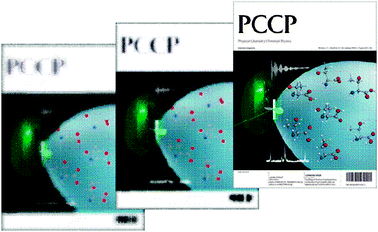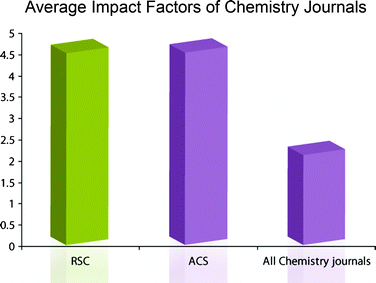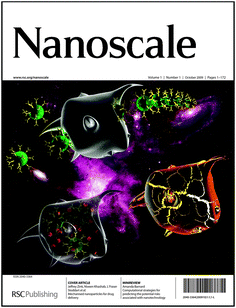A focus on success
Welcome to the first issue of PCCP of 2010. This Editorial showcases some of PCCP’s extraordinary recent successes, and looks forward to the exciting developments you can expect in the year ahead.
Onwards and upwards
We are delighted to report that PCCP continues to thrive, building on the achievements of recent years. Indeed, we feel that PCCP has evolved since its launch in 1999 into a true “journal of choice” for the broad scientific community it serves. This success can perhaps be illustrated with three simple statistics:• Submissions rose to another new high in 2009, growing by over 40% compared to the previous year (Fig. 1).
• Whilst maintaining our strict quality standards and exceptional levels of service, the size of the published journal grew significantly. We published over 11![[thin space (1/6-em)]](https://www.rsc.org/images/entities/char_2009.gif) 000 pages in 2009, making it by far our biggest ever volume.
000 pages in 2009, making it by far our biggest ever volume.
• The PCCP Impact Factor yet again enjoyed another big rise, of over 20%. Our latest Impact Factor was released in June 2009, and now stands at 4.06—a new record high (see Fig. 2).
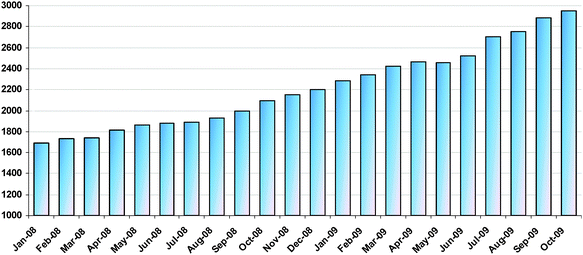 | ||
| Fig. 1 Rolling annual submissions to PCCP. | ||
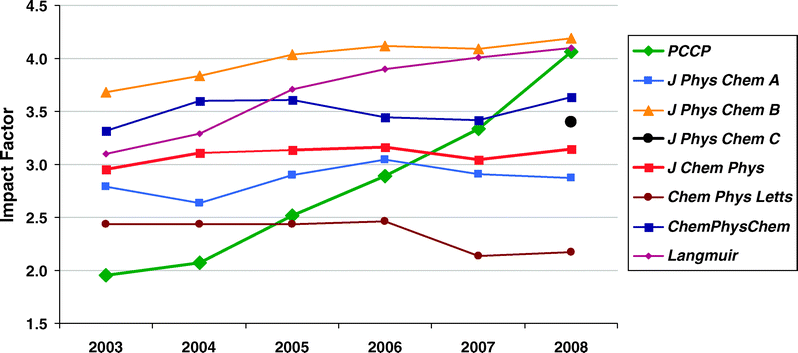 | ||
| Fig. 2 Impact Factor trends of general physical chemistry journals. | ||
What we publish
We believe that PCCP offers the best forum for publishing research containing important physical insight in physical chemistry, chemical physics and biophysical chemistry. The journal scope is broad, and our truly international readership similarly spans many communities: from nanoscience to biophysical chemistry, from interfacial experiments to new theoretical developments, from attosecond spectroscopy through to nanoscale physics, and on to micro- and macro-scale studies of global importance.Our stated aim continues to be publishing insightful research of the highest quality, covering the entire scope, in every issue. We anticipate further growth in the size of the journal in 2010 to ensure we continue to meet this goal.
Moreover, science is most effective when artificial barriers aren’t created. By publishing PCCP as a single volume (rather than splitting the journal into different sections) we believe we provide additional benefit, helping bring important and interdisciplinary work to the attention of the whole community.
Our standards and service
The reputation of any journal rests on the peer-review procedure it implements and the level of service it provides. As a Society journal published on a not-for-profit basis, PCCP continues to carry out a rigorous yet fair system of peer review, undertaken by international expert referees to whose dedication we pay tribute.Moreover, our team of highly-qualified professional Editors offer an exceptional service to our authors, and ensure that our renowned times-to-publication are maintained and reduced. Our world-class Editorial and Advisory Boards continue to provide significant input into the Editorial process, meaning PCCP benefits from a fair, efficient and independent peer-review system that is also underpinned by distinguished full-time practising researchers.
We are delighted to welcome two new members to the PCCP Editorial Board from the beginning of 2010—Professors Marie-Paule Pileni (University Pierre & Marie Curie, Paris), and Li-Jun Wan (ICCAS, Beijing). Both bring a wealth of experience to the journal. We also welcome new Advisory Board members Professors Carlo Adamo (Paris), Katsuhiko Ariga (NIMS, Japan), So Hirata (Florida), Asuka Fujii (Tohoku), Jairton Dupont (UFRGS, Brazil), Efrat Lifshitz (The Technion, Israel), and Dage Sundholm (Helsinki). We warmly thank retiring Board members for their hard work.
 | ||
| Plate1 Marie-Paule Pileni | ||
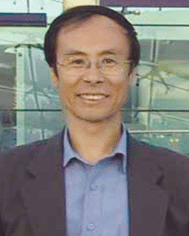 | ||
| Plate2 Li-Jun Wan | ||
Themed issues
One way we continue to enhance the journal and highlight topical areas of current interest is through the publication of PCCP themed issues. These are carefully selected by the PCCP Editorial Board, and have been very well received by readers and authors alike.2009 saw a large expansion in the number of themed issues we published, giving us the flexibility to focus on a greater number of exciting research areas.
From issues on The Physical Chemistry of Aerosols to Solid State NMR Spectroscopy, from Time-dependent DFT to Metal Oxide Nanostructures, we hope there was something for everyone. We thank our Guest Editors for all their hard work to ensure these issues were such a success.
| Nucleic Acid Simulations | Issue 45, 2009 |
| Physical Chemistry of Aerosols | Issue 36, 2009 |
| New Frontiers in Surface-enhanced Raman Scattering | Issue 34, 2009 |
| Solid-state NMR Spectroscopy | Issue 32, 2009 |
| Modern EPR Spectroscopy: Beyond the EPR Spectrum | Issue 31, 2009 |
| Nanophotonics: Plasmonics and Metal Nanoparticles | Issue 28, 2009 |
| Physical Chemistry of Biomolecular Motors and Machines | Issue 24, 2009 |
| Electronic Structures and Reaction Dynamics of Open-shell Species | Issue 23, 2009 |
| Time-dependent Density-functional Theory | Issue 22, 2009 |
| Chemistry and Physics of Metal Oxide Nanostructures | Issue 19, 2009 |
| Physical Chemistry of Solids—the Science Behind Materials Engineering | Issue 17, 2009 |
| Molecules in Confined Spaces | Issue 16, 2009 |
| Coarse-grained Modeling of Soft Condensed Matter | Issue 12, 2009 |
A lively mix of further themed issues is planned for 2010, including themes on The Influence of Ionic Liquids of Physico-chemical Reactions, on Interfacial Systems Chemistry, and a wide-ranging series of themed issues covering the latest topics in biophysical chemistry. Further details about these and other themed issues “in the pipeline” are available on a dedicated “themed issue” page on our website, www.rsc.org/pccp.
All authors of papers published in PCCP themed issues will continue to receive a complimentary print copy of the issue when it is published, as well as get all our usual benefits including very quick publication times, flexibility in file formats and article layouts at the submission stage, and the use of free colour. We always appreciate ideas for new themed issues—please do contact us at pccp@rsc.org with your views.
Looking to the future
PCCP continues to go from strength to strength, and we thank everyone in the scientific community who has contributed to the successes of the journal. It is the authors, Board members, readers and referees who make PCCP what it is, and we thank you all for your support.We do not rest on our laurels, however, and are looking forward to building on our achievements over the coming months and years. Like any successful organisation, we continue to re-evaluate our systems and procedures, and use the latest technology, to ensure we deliver the highest levels of service.
PCCP is your journal, and comments, suggestions and feedback are always welcome; as ever, please do contact us at pccp@rsc.org with your thoughts.
With our very best wishes for the New Year,
Philip Earis, Editor, PCCP
Pekka Pyykkö, Chair, PCCP Editorial Board
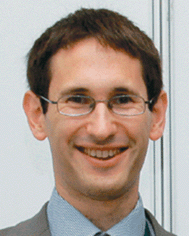 | ||
| Plate3 Philip Earis | ||
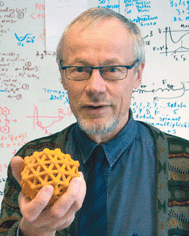 | ||
| Plate4 Pekka Pyykkö | ||
News from RSC Publishing
New integrated content delivery platform
RSC Publishing is proud to announce the launch of our powerful new content delivery platform that supports multiple content types. Powered by the industry's leading MarkLogic Server, and benefiting from the interactive browsing functionality offered by RSC’s enhanced html mark-up technology, the platform delivers exceptionally fast and precise results. Users can now search 165 years of world-class RSC-hosted content including 20![[thin space (1/6-em)]](https://www.rsc.org/images/entities/char_2009.gif) 000 book chapters, 300
000 book chapters, 300![[thin space (1/6-em)]](https://www.rsc.org/images/entities/char_2009.gif) 000 journal articles and 450
000 journal articles and 450![[thin space (1/6-em)]](https://www.rsc.org/images/entities/char_2009.gif) 000 database records from a single, simple search. Designed around readers’ preferences (identified from a detailed and ongoing user-interview process), our user-friendly platform offers faster browsing, intelligent searching, consistent user experience irrespective of content type sought, and simpler more intuitive navigation. We’ll be releasing even more exciting functionality later in the year. Please tell us what you think at rscpublishing@rsc.org.
000 database records from a single, simple search. Designed around readers’ preferences (identified from a detailed and ongoing user-interview process), our user-friendly platform offers faster browsing, intelligent searching, consistent user experience irrespective of content type sought, and simpler more intuitive navigation. We’ll be releasing even more exciting functionality later in the year. Please tell us what you think at rscpublishing@rsc.org.
ChemSpider
Last year RSC acquired ChemSpider, the richest single source of structure-based chemistry information freely available online, with fast searching of over 21.5 million chemical structures. Alongside the powerful database, the ChemSpider development team brings well over 40 years of additional cheminformatics experience to the RSC, including a chemistry-centric document markup system capable of finding chemical names, converting to chemical structures and linking to online resources. Integration of this technology with RSC’s existing award-winning enhanced html mark-up technology, RSC Prospect, will lead to substantial enhancements in semantic enrichment for the chemical sciences. Find out more at www.chemspider.com.Continued e-alert success in 2010
2009 saw the launch of the new RSC journal e-alerts; in 2010 we are hoping to see a continued rise in their popularity. The e-alerts are packed with information and links enabling readers to easily view content as soon as it’s published, helping them to stay abreast of journal content. The new e-alert registration system has been designed so readers can manage their own subscriptions, tailoring the information they receive and giving them the freedom to unsubscribe at any point. You can find out more information online: www.rsc.org/alerts.New for 2010: the RSC eBook subject collections
In response to readers’ needs and as a testament to the innovation of RSC Publishing, we are pleased to announce the launch of new RSC eBook Subject Collections.The 9 new RSC eBook Subject Collections, including a Tutorial Chemistry Texts and Paperbacks package, deliver the high quality content contained in our books into subject specialist packages. With new content being uploaded throughout the year, the new RSC eBook Subject Collections are set to become another key, premier resource. To find out more, please visit www.rsc.org/ebooks.
High impact publishing
Publication of the 2008 impact factors, calculated by ISI, once again brought good news for authors and readers of RSC journals. Nearly all the RSC journals increased in impact factor, immediacy index and article influence, with an impressive average impact factor increase of 8.2%. Overall, the average impact factor for the RSC portfolio now stands at 4.7, equal to that of the ACS collection.RSC journals feature in the top 10 rankings (by impact factor and immediacy index) in 6 of the 7 core chemistry categories as listed on ISI, and of the top 100 chemistry journals, ranked by impact factor, 15 are from RSC Publishing.
Journal information
Chemical Science
This new flagship journal will launch in mid-2010, and will publish findings of exceptional significance from across all the chemical sciences. Editor-in-Chief Professor David MacMillan of Princeton leads a dynamic international team of Associate Editors responsible for the scientific development of the journal. Free institutional online access to the entire 2010 and 2011 content of Chemical Science will be automatically provided to all existing customers.Keep in touch with the latest news at www.rsc.org/chemicalscience.
…on a related note
RSC is pleased to announce a significant new global symposium series supporting the launch of the Chemical Science. The International Symposia on Advancing the Chemical Sciences (ISACS) meetings will be held on three continents, over three sequential weeks, focusing on distinct subject areas. More information can be found at: www.rsc.org/isacs.A brand new journal, at the Nanoscale
Nanoscale, a new journal encompassing experimental and theoretical work across the breadth of nanoscience and nanotechnology, met with resounding success when it published its first articles in August 2009. Now in its second volume, the journal, which is a collaborative venture between RSC Publishing and the National Center for Nanoscience and Technology (NCNST) in Beijing, China, continues to showcase important and high quality nano-research, providing a forum that is essential reading for all scientific communities working at the nanoscale. Read more at www.rsc.org/nanoscale.Free access available for all new RSC journals
Free institutional online access is available for all our newest journals. Access, which is managed by institution and IP address, is provided following a simple registration process. Make sure you and your colleagues don’t miss out on the free access by filling in the registration form: www.rsc.org/free_access_registration.| This journal is © the Owner Societies 2010 |

